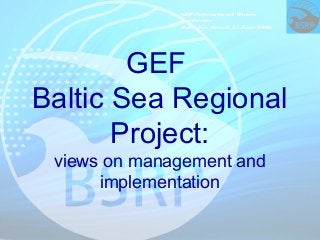
GEF: Baltic Sea Project: View on Management and Implementation
- 1. GEF International Waters Conference Salvador, Brazil, 21 June 2005 GEF Baltic Sea Regional Project: views on management and implementation
- 2. GEF International Waters Conference Salvador, Brazil, 21 June 2005 Sweden Finland Estonia Russia Latvia Lithuania Poland Germany Denmark Norway Baltic Sea: Main Characteristics • Semi-enclosed brackish water area •Persistent vertical layers •Residence time of water : 25yrs •Renewal of bottom-water: unpredictable - often stagnation periods •Plants/animals: low numbers - stressed •Large catchment area with land use activities strong effect on water quality - population - 85 million
- 3. GEF International Waters Conference Salvador, Brazil, 21 June 2005 International Managing Bodies International Baltic Sea Fishery Commission Scientific Advice 350 scientists BSRP: HELCOM and ICES
- 4. GEF International Waters Conference Salvador, Brazil, 21 June 2005 Land CoastalMarine Training farmers Grant/Credit on-farm invest- ments. Modeling water quality and nutrient transport Fish/envionm. Joint integrated ass. surveys Ships of Opportunity Ecosystem Health parameters Strengthening technical capacity, WS.s Upgrade laboratories and ships Improve scientific/and political coordination The Baltic LME conceptThe Baltic LME concept CZM Salmon river rest. COMBINE Strengthening technical capacity Toxins/impact C1 C2
- 5. GEF International Waters Conference Salvador, Brazil, 21 June 2005 LL Biodiversity St. Petersburg Co-LPM SOOP Tallinn Co-LPM CZM Co-LPM MMED BSRP Working Structure LIU and CC Fisheries Riga LL ICES surveys Kaliningrad LL Coast. Activities Tallinn LL Fish age/ Stomach anal Riga LL Salmon restor. Riga CC Ecosystem Health Gdynia LL Alien Species Klaipeda LL Fish diseases Kaliningrad LIU and CC Productivity Riga LL Zooplankton Gdynia LL Phytob.monit, SOOP Tallinn LIU andCC GIS & Data Vilnius LIU and CC Socio-economy Tallinn Coordinators, C1, C2 CC: Coordination Centre LL: Lead Laboratory LIU: Local Implem. unit
- 6. GEF International Waters Conference Salvador, Brazil, 21 June 2005 BSRP 1st phase • Scientists/farmers • Politicians • Conventions – International organizations Cooperators + + + - Strengthened Cooperation,coordination MoU , LoA , + network + EU , Reg. Program Actors: Too much national
- 7. GEF International Waters Conference Salvador, Brazil, 21 June 2005 Key-words: BSRP 2:nd phase BIREME BONUS BOOS SAFMAMS BONUS-169 Major challenge: GEF/BSRP: has been a Catalyser Major stength: POLITICIANS (national owners) INTEGRATION and OUTREACH Organization
